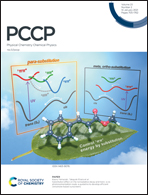Salting-in and salting-out effects of short amphiphilic molecules: a balance between specific ion effects and hydrophobicity
Abstract
Amphiphilic molecules (e.g. hydrotropes) that enhance the solubility of hydrophobic compounds in water are often charged. As a result, such compounds also show specific ion effects. These effects can either strengthen or weaken the solubilisation power of amphiphilic molecules, depending on their degree of ion hydration. They can even prevail and transform an apparent solubilizer into an “anti-hydrotrope”, i.e. a salting-out agent. In the present paper, we discuss this subtle balance between specific (Hofmeister) effects exerted by ionic headgroups and the hydrophobicity of the residual compound structure, including the size of the molecule and the presence of electron-withdrawing groups.



 Please wait while we load your content...
Please wait while we load your content...